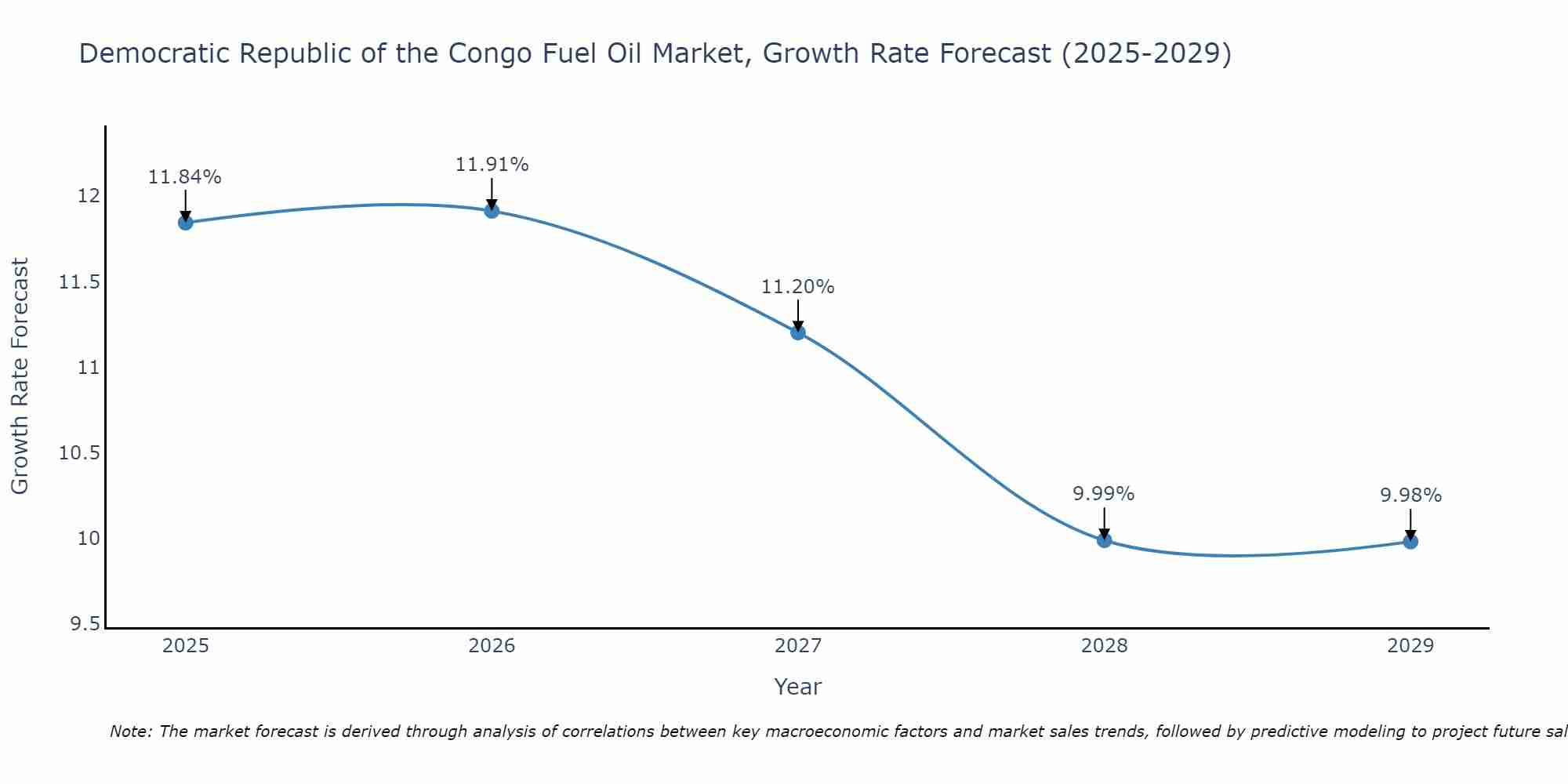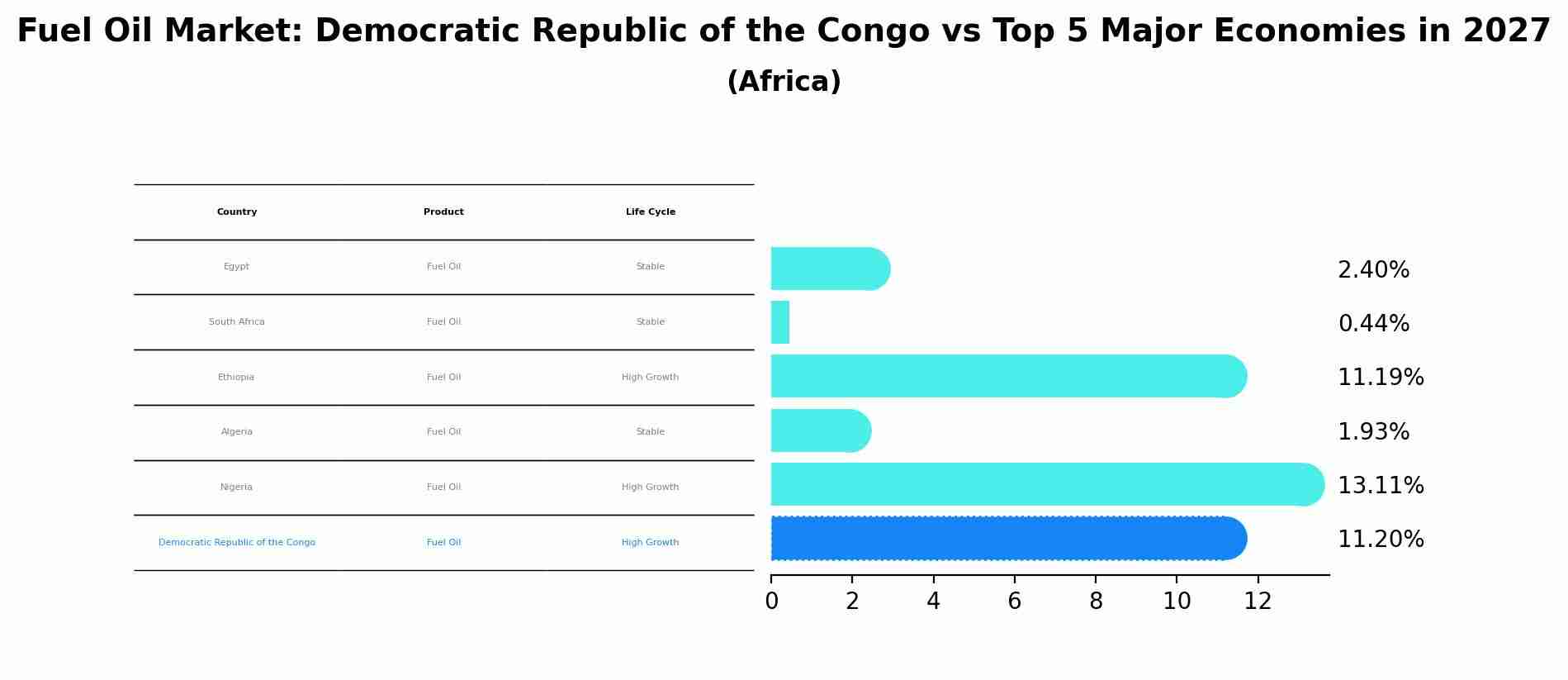Congo Fuel Oil Market (2025-2031) | Forecast, Segmentation, Industry, Revenue, Outlook, Analysis, Size, Growth, Trends, Share, Companies & Value
| Product Code: ETC5044044 | Publication Date: Nov 2023 | Updated Date: Apr 2025 | Product Type: Market Research Report | |
| Publisher: 6Wresearch | Author: Sachin Kumar Rai | No. of Pages: 60 | No. of Figures: 30 | No. of Tables: 5 |
Democratic Republic of the Congo Fuel Oil Market Size Growth Rate
The Democratic Republic of the Congo Fuel Oil Market is projected to witness mixed growth rate patterns during 2025 to 2029. Growth accelerates to 11.91% in 2026, following an initial rate of 11.84%, before easing to 9.98% at the end of the period.

Fuel Oil Market: Democratic Republic of the Congo vs Top 5 Major Economies in 2027 (Africa)
In the Africa region, the Fuel Oil market in Democratic Republic of the Congo is projected to expand at a high growth rate of 11.20% by 2027. The largest economy is Egypt, followed by South Africa, Ethiopia, Algeria and Nigeria.

Congo Fuel Oil Market Overview
The fuel oil market in Congo is linked to the energy needs of industries, power generation, and transportation. Fuel oil is used in boilers, furnaces, and ships, providing a reliable energy source for various applications. The market is influenced by global oil prices, domestic energy policies, and the demand for alternative energy sources that reduce carbon emissions.
Drivers of the market
The Congo fuel oil market is influenced by the rising demand for energy in various sectors, including power generation, transportation, and industrial applications. The expansion of infrastructure projects and the growth of the manufacturing sector contribute to increased fuel oil consumption. Additionally, fluctuations in global oil prices and the need for reliable energy sources drive the market. The ongoing transition towards cleaner energy solutions also impacts the fuel oil market by encouraging advancements in fuel efficiency and emission control technologies.
Challenges of the market
The fuel oil market in Congo faces challenges related to high import costs and limited local refining capacity. Additionally, logistical issues and infrastructure constraints can affect the distribution and availability of fuel oil. There is also a need for better regulatory oversight and environmental management in the fuel oil sector.
Government Policy of the market
To support the energy sector, the government of Congo is promoting the fuel oil market. Policies include providing incentives for local refining and distribution of fuel oil, reducing import duties on fuel oil components and equipment, and supporting research into more efficient and environmentally friendly fuel oil technologies. The government is also working to establish regulations to ensure the quality and safety of fuel oil products.
Key Highlights of the Report:
- Congo Fuel Oil Market Outlook
- Market Size of Congo Fuel Oil Market, 2024
- Forecast of Congo Fuel Oil Market, 2031
- Historical Data and Forecast of Congo Fuel Oil Revenues & Volume for the Period 2021-2031
- Congo Fuel Oil Market Trend Evolution
- Congo Fuel Oil Market Drivers and Challenges
- Congo Fuel Oil Price Trends
- Congo Fuel Oil Porter`s Five Forces
- Congo Fuel Oil Industry Life Cycle
- Historical Data and Forecast of Congo Fuel Oil Market Revenues & Volume By Application for the Period 2021-2031
- Historical Data and Forecast of Congo Fuel Oil Market Revenues & Volume By Marine for the Period 2021-2031
- Historical Data and Forecast of Congo Fuel Oil Market Revenues & Volume By Industrial for the Period 2021-2031
- Historical Data and Forecast of Congo Fuel Oil Market Revenues & Volume By Others for the Period 2021-2031
- Congo Fuel Oil Import Export Trade Statistics
- Market Opportunity Assessment By Application
- Congo Fuel Oil Top Companies Market Share
- Congo Fuel Oil Competitive Benchmarking By Technical and Operational Parameters
- Congo Fuel Oil Company Profiles
- Congo Fuel Oil Key Strategic Recommendations
Frequently Asked Questions About the Market Study (FAQs):
1 Executive Summary |
2 Introduction |
2.1 Key Highlights of the Report |
2.2 Report Description |
2.3 Market Scope & Segmentation |
2.4 Research Methodology |
2.5 Assumptions |
3 Congo Fuel Oil Market Overview |
3.1 Congo Country Macro Economic Indicators |
3.2 Congo Fuel Oil Market Revenues & Volume, 2021 & 2031F |
3.3 Congo Fuel Oil Market - Industry Life Cycle |
3.4 Congo Fuel Oil Market - Porter's Five Forces |
3.5 Congo Fuel Oil Market Revenues & Volume Share, By Application, 2021 & 2031F |
4 Congo Fuel Oil Market Dynamics |
4.1 Impact Analysis |
4.2 Market Drivers |
4.3 Market Restraints |
5 Congo Fuel Oil Market Trends |
6 Congo Fuel Oil Market Segmentations |
6.1 Congo Fuel Oil Market, By Application |
6.1.1 Overview and Analysis |
6.1.2 Congo Fuel Oil Market Revenues & Volume, By Marine, 2021-2031F |
6.1.3 Congo Fuel Oil Market Revenues & Volume, By Industrial, 2021-2031F |
6.1.4 Congo Fuel Oil Market Revenues & Volume, By Others, 2021-2031F |
7 Congo Fuel Oil Market Import-Export Trade Statistics |
7.1 Congo Fuel Oil Market Export to Major Countries |
7.2 Congo Fuel Oil Market Imports from Major Countries |
8 Congo Fuel Oil Market Key Performance Indicators |
9 Congo Fuel Oil Market - Opportunity Assessment |
9.1 Congo Fuel Oil Market Opportunity Assessment, By Application, 2021 & 2031F |
10 Congo Fuel Oil Market - Competitive Landscape |
10.1 Congo Fuel Oil Market Revenue Share, By Companies, 2024 |
10.2 Congo Fuel Oil Market Competitive Benchmarking, By Operating and Technical Parameters |
11 Company Profiles |
12 Recommendations | 13 Disclaimer |
Export potential assessment - trade Analytics for 2030
Export potential enables firms to identify high-growth global markets with greater confidence by combining advanced trade intelligence with a structured quantitative methodology. The framework analyzes emerging demand trends and country-level import patterns while integrating macroeconomic and trade datasets such as GDP and population forecasts, bilateral import–export flows, tariff structures, elasticity differentials between developed and developing economies, geographic distance, and import demand projections. Using weighted trade values from 2020–2024 as the base period to project country-to-country export potential for 2030, these inputs are operationalized through calculated drivers such as gravity model parameters, tariff impact factors, and projected GDP per-capita growth. Through an analysis of hidden potentials, demand hotspots, and market conditions that are most favorable to success, this method enables firms to focus on target countries, maximize returns, and global expansion with data, backed by accuracy.
By factoring in the projected importer demand gap that is currently unmet and could be potential opportunity, it identifies the potential for the Exporter (Country) among 190 countries, against the general trade analysis, which identifies the biggest importer or exporter.
To discover high-growth global markets and optimize your business strategy:
Click Here- Single User License$ 1,995
- Department License$ 2,400
- Site License$ 3,120
- Global License$ 3,795
Search
Thought Leadership and Analyst Meet
Our Clients
Related Reports
- India Switchgear Market Outlook (2026 - 2032) | Size, Share, Trends, Growth, Revenue, Forecast, Analysis, Value, Outlook
- Pakistan Contraceptive Implants Market (2025-2031) | Demand, Growth, Size, Share, Industry, Pricing Analysis, Competitive, Strategic Insights, Strategy, Consumer Insights, Analysis, Investment Trends, Opportunities, Revenue, Segments, Value, Segmentation, Supply, Forecast, Restraints, Outlook, Competition, Drivers, Trends, Companies, Challenges
- Sri Lanka Packaging Market (2026-2032) | Outlook, Competition, Drivers, Trends, Demand, Pricing Analysis, Competitive, Strategic Insights, Companies, Challenges, Strategy, Consumer Insights, Analysis, Investment Trends, Opportunities, Growth, Size, Share, Industry, Revenue, Segments, Value, Segmentation, Supply, Forecast, Restraints
- India Kids Watches Market (2026-2032) | Strategy, Consumer Insights, Analysis, Investment Trends, Opportunities, Growth, Size, Share, Industry, Revenue, Segments, Value, Segmentation, Supply, Forecast, Restraints, Outlook, Competition, Drivers, Trends, Demand, Pricing Analysis, Competitive, Strategic Insights, Companies, Challenges
- Saudi Arabia Core Assurance Service Market (2025-2031) | Strategy, Consumer Insights, Analysis, Investment Trends, Opportunities, Growth, Size, Share, Industry, Revenue, Segments, Value, Segmentation, Supply, Forecast, Restraints, Outlook, Competition, Drivers, Trends, Demand, Pricing Analysis, Competitive, Strategic Insights, Companies, Challenges
- Romania Uninterruptible Power Supply (UPS) Market (2026-2032) | Industry, Analysis, Revenue, Size, Forecast, Outlook, Value, Trends, Share, Growth & Companies
- Saudi Arabia Car Window Tinting Film, Paint Protection Film (PPF), and Ceramic Coating Market (2025-2031) | Strategy, Consumer Insights, Analysis, Investment Trends, Opportunities, Growth, Size, Share, Industry, Revenue, Segments, Value, Segmentation, Supply, Forecast, Restraints, Outlook, Competition, Drivers, Trends, Demand, Pricing Analysis, Competitive, Strategic Insights, Companies, Challenges
- South Africa Stationery Market (2025-2031) | Share, Size, Industry, Value, Growth, Revenue, Analysis, Trends, Segmentation & Outlook
- Afghanistan Rocking Chairs And Adirondack Chairs Market (2026-2032) | Size & Revenue, Competitive Landscape, Share, Segmentation, Industry, Value, Outlook, Analysis, Trends, Growth, Forecast, Companies
- Afghanistan Apparel Market (2026-2032) | Growth, Outlook, Industry, Segmentation, Forecast, Size, Companies, Trends, Value, Share, Analysis & Revenue
Industry Events and Analyst Meet
Whitepaper
- Middle East & Africa Commercial Security Market Click here to view more.
- Middle East & Africa Fire Safety Systems & Equipment Market Click here to view more.
- GCC Drone Market Click here to view more.
- Middle East Lighting Fixture Market Click here to view more.
- GCC Physical & Perimeter Security Market Click here to view more.
6WResearch In News
- Doha a strategic location for EV manufacturing hub: IPA Qatar
- Demand for luxury TVs surging in the GCC, says Samsung
- Empowering Growth: The Thriving Journey of Bangladesh’s Cable Industry
- Demand for luxury TVs surging in the GCC, says Samsung
- Video call with a traditional healer? Once unthinkable, it’s now common in South Africa
- Intelligent Buildings To Smooth GCC’s Path To Net Zero


















